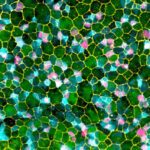Link to Pubmed [PMID] – 21957242
J. Neurosci. 2011 Sep;31(39):13796-807
Behavioral syndromes are suites of two or more behaviors that correlate across environmental contexts. The aggression-boldness syndrome links aggression, boldness, and exploratory activity in a novel environment. Although aggression-boldness has been described in many animals, the mechanism linking its behavioral components is not known. Here we show that mutation of the gene encoding fibroblast growth factor receptor 1a (fgfr1a) simultaneously increases aggression, boldness, and exploration in adult zebrafish. We demonstrate that altered Fgf signaling also results in reduced brain histamine levels in mutants. Pharmacological increase of histamine signaling is sufficient to rescue the behavioral phenotype of fgfr1a mutants. Together, we show that a single genetic locus can underlie the aggression-boldness behavioral syndrome. We also identify one of the neurotransmitter pathways that may mediate clustering of these behaviors.

